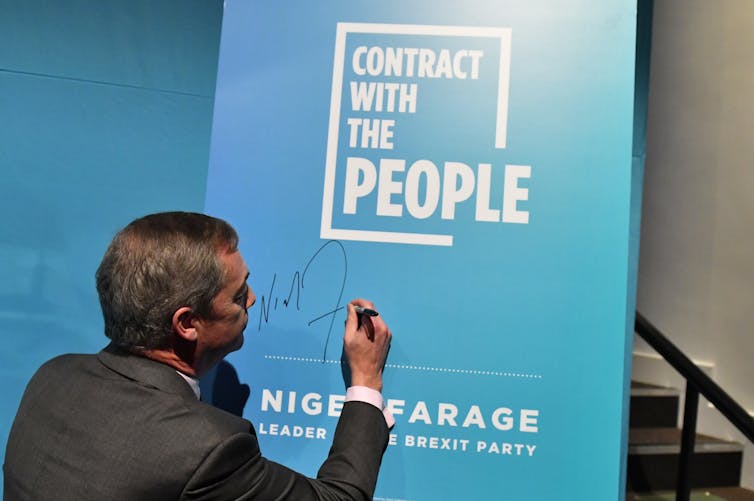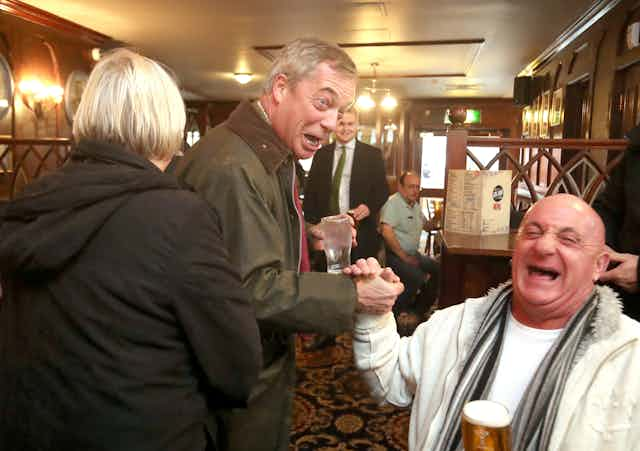If the Conservatives are to gain a majority in the upcoming election, it will hinge on the Brexit Party’s unofficial support. The latter has stood down its candidates in all 317 Conservative-held seats, reduced its criticism of Boris Johnson’s government and taken full aim at traditional Labour-held seats on the campaign so far. The goal is to capture Labour voters, splitting the Remain vote. Consequently, this should facilitate a Conservative victory and ensure that Brexit is achieved.
Where other parties have published their traditional election manifestos, setting out their proposed policies for government, the Brexit Party produced what it is calling a “contract with the people”.
As expected, the Brexit Party’s flagship policy is to leave the EU entirely (including the customs union and single market) without a deal. The party insists this restores the UK’s freedom to “reshape” its future by returning sovereignty on “laws, borders, money, fishing and defence”.
With television doctor David Bull as its health spokesman, the party insists the NHS must remain publicly owned and better funded. It challenges steps towards privatisation already taken, such as the Private Finance Initiatives that have “burdened the NHS with billions of pounds of debt”. Fundamentally, the party insists that a “clean-break Brexit” would not involve NHS privatisation.
The Brexit Party says it is aiming to crack down on illegal immigration and human trafficking. Party leader, Nigel Farage, has claimed that his party would intend to reduce UK net migration to 50,000 a year with a points-based immigration system that is “blind to ethnic origin”. It’s worth noting that this precise figure does not actually feature in the “contract” – suggesting it perhaps shouldn’t be taken as a firm commitment.
A populist ‘political revolution’
The Brexit Party says it is aiming for nothing short of a “political revolution”. It wants to reform the electoral system to be more proportional. This reflects the fact that the UK’s electoral system has historically excluded minor parties. One clear example is the 2015 general election, when UKIP won 12.6% of the national vote but only one seat in parliament. Farage would be keen to avoid a repeat.
It also wants to abolish the unelected House of Lords, replacing it with a “smaller, democratic second chamber”. However, this could cause a potential power imbalance with the House of Commons.
Another goal is to Americanise the Supreme Court, with a greater role for parliament in appointing judges. This is deemed necessary after the court’s 2017 ruling that parliament must be given a vote on whether to trigger Article 50 to begin the Brexit process. This all adds to the Brexit Party’s populist rhetoric of “the elite” being against the common will of “the people”.

Citizens should also be able to call referendums, the party suggests, provided 5 million people register to vote in support of one. Interestingly, this idea originates from the European Union. We might also remember that 6 million people signed the petition to revoke Article 50 – although it is unclear how many were eligible voters.
Who is it for?
The Brexit Party’s target audience is predominantly voters in the “Brexit heartlands” of the north, the Midlands and Wales. This is clear from several pledges aimed at the politically disenchanted working and lower-middle class voters.
While the Liberal Democrats are promising a “Remain bonus” if the UK stays in the EU, the Brexit Party is touting the exact opposite in a £200 billion “Brexit dividend”. This will be funded by cutting 50% of the UK’s foreign aid budget, scrapping the HS2 high-speed rail project and saving £13 billion a year in EU payments.
Billions of pounds would be channelled into “regional regeneration” alongside removing VAT on domestic fuel to reduce energy bills. These are clear bids for votes in deprived Labour-held seats. For coastal communities, there will be a £2.5 billion investment to regenerate jobs and tourism.
It also appears to have partially adopted the Labour Party’s policy for free public broadband, by suggesting it would offer “free base level domestic broadband in deprived regions and free Wi-Fi on all public transport”.
Smaller businesses are also supported through a zero-rate corporation tax on the first £10,000 of pre-tax profit. Yet the Brexit Party only intends to offer a “safety net” of basic state provisions, rather than the wholescale redistribution of wealth proposed by Labour. Meanwhile a pledge to abolish inheritance tax – referred to as a “grief tax” – could be seen as a play for older voters.
The Brexit Party also proposes some progressive policies – from removing interest from student loans to planting millions of trees. It wants to recycle waste in the UK, making it illegal to export waste to other countries “to be burnt, buried or dumped at sea”.
The Brexit Party knows that it has no realistic chance of becoming the party of government in this election, so these pledges serve a different purpose. The primary objective is to push for Brexit by winning as many votes as possible and proving that the British people still want to leave the EU. All the other populist bells and whistles are designed to win as many people over to the cause as possible – particularly Labour voters. This will enable the Brexit Party to continue to exert pressure on whichever party does win.


